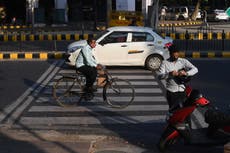Angry farmers threaten to besiege Delhi as protests outside Indian capital enter fifth day
Police used water cannon and tear gas shells on thousands of farmers protesting against the new agricultural reforms

India’s farmers have intensified their protests against the controversial farm laws in Delhi, as the fifth day of the agitation was marked by a series of road closures besieging the national capital.
On Sunday, the farmers announced that they would begin blocking five entry points to the capital city — Sonipat, Rohtak, Jaipur, Ghazipur, Hapur and Mathura, covering the all three states the city has major entry points from.
The impact of the protests is being witnessed most in the northern and western areas of Delhi, which borders the state of Haryana, as the city traffic police advised the commuters to avoid Singhu and Tikri borders. The police in Ghazipur, the capital’s border with the neighbouring Uttar Pradesh, placed concrete barriers on the highway in order to prevent the rising number of farmers to enter into the capital.
Anger against the Modi government’s new farm laws has been simmering in the northern states of India, especially in the agri-hubs Punjab and Haryana, where the protests have been ongoing for weeks.
The tussle between the central government and the farmers escalated on 26 November, when thousands of farmers from Punjab and Haryana decided to march towards the capital city to put pressure on the Narendra Modi-led federal government.
However, the centrally controlled Delhi police used water cannon and tear gas shells on the protesting farmers, including beating them up with sticks, drawing widespread criticism from the people, opposition parties and celebrities.
The Haryana government, in an unprecedented move, also dug-up the national highway in order to prevent farmers from entering.
Prohibitory orders under Section 144 of the Indian law were imposed in several parts of Haryana to prevent the assembly of protesters. The bus service to Punjab from Haryana has been suspended too.
At the centre of the protests are three new controversial agricultural laws passed by the Modi government on 17 September, that they say will provide a 'one nation, one market’ option to farmers and attract private investment in the sector.
But farmers’ rights groups say the new laws will lead to the corporatisation of agriculture and dismantle the minimum support price (MSP) system that ensures a safe price for farmers in the government-controlled Mandis (markets).
Farmers are pushing the Union government to either withdraw the three new legislations or guarantee them the minimum support price for their crops.
The opposition parties have suggested the government passed the law without taking the farmers’ objections into consideration and must listen to them.
India’s prime minister, speaking at a highway inauguration event in his constituency Varanasi on Monday evening, hit back at those criticising the law saying that “some people are trying to trick farmers for votes”.
“Farmers are being empowered by giving them the option of a bigger market,” he said.
Union Home minister Amit Shah, Defence minister Rajnath Singh and Agriculture minister Narendra Singh Tomar held deliberations over the farmers' protest with BJP president J P Nadda late on Sunday evening.
A meeting of the protesting farmers' unions has already been scheduled on 3 December. However, the farmers are planning to escalate their protests in the coming days.
Join our commenting forum
Join thought-provoking conversations, follow other Independent readers and see their replies
Comments


Bookmark popover
Removed from bookmarks